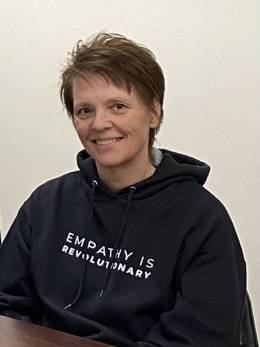Editor’s Note: This is the third in a series of articles for May’s Mental Health Awareness focus. Despite it being the last day of the month, no topic as important as mental health can be hemmed into such a short time span anyway, as Genesee County Mental Health Director Lynda Battaglia says. Besides, this kicks off June’s “Rebuild Your Life Month,” which will continue with additional articles.

Lather, rinse, repeat.
That’s how it felt for Sue Gagne when dealing with a family member struggling with mental illness, she said.
“I would say early in my career as a family member, I didn't know anything about mental illness. And when my loved one first started exhibiting symptoms, the rest of the family didn't really know what to do. So we would wait for a crisis; we would call 911. (Law enforcement) would come and either take them away or settle things down,” Gagne said during an interview with The Batavian. "And I always, when I do the (Crisis Intervention Team) training, I say, you know, it's like, wet, lather, rinse, repeat. It was just this continual cycle of, 'we don't know what to do.'"
Gagne made up for that lack of knowledge and ended up diving head first into the mental health field, formerly as the executive director at the Mental Health Association of Genesee and Orleans Counties, dual recovery coordinator for the GLOW region, a recovery center coordinator at GCASA, and a Suicide Prevention Coalition leader before her most recent professional endeavor of becoming a registered nurse.
Until the formal lessons, however, there were plenty of hands-on observations of that family members’ struggle: yelling, hearing and seeing things that the remaining family didn’t hear or see, the ensuing turmoil that resulted, regularly charged manic behavior that became part of a bipolar existence of low and highs, Gagne said.
“Like hearing people outside the window. You know what mental illness is, and that it's in your family, you go check, like, okay, that's possible, somebody could be out there, you know … things that aren't really happening, but you don't know they're not real, because you're still believing this person. So a lot of confusion, I would say chaos and confusion,” she said. “And then, meanwhile, you're trying to live your own life.”
There were police arrests, substance use, being locked in a psychiatric ward and put on medications until the family member began to feel better and then would stop taking the meds. As Gagne said, wash, rinse, repeat.
Does it ever end? What happened in your case?
“It just keeps going. And then, one day, NAMI came into my life, which is National Alliance for Mental Illness in Rochester. And I recognized that I'm not the only one who deals with this … it's a lot of stigma and shame that keeps you not wanting to reach out. And I really didn't know where to reach out," she said. "But once I met with NAMI, it shifted my whole way of thinking. My thought early on was like, take them to the hospital, medicate them, send them back the way they used to be. And that was just ignorance on my part. This has been lifelong for my situation. And I think once I could get in my head that I am this person's support, that I'm on their team, that I'm part of their recovery team. That shifted the whole dynamic.
"NAMI taught me to be able to talk about mental illness as it's part of who that person is and what makes up that person. So, I think that was one thing. Navigating the mental health system for family members is not easy, I found, but if you can get educated about the person's diagnosis, you can have releases signed with therapists to be on that team.
"I'm part of my family member’s team, and they do this, and I'll come around this way and be like, you know, how can we support that? But also having good boundaries because you can burn out from caregiving. I think that's a huge thing."
So do you still have your family members in your life?
“I do, loving them every minute of the day. But it's ongoing, I think that's why you have to take care of yourself. In a crisis it's like it's all hands on deck. Let's do it. But, you know, I think that was something else I learned -- I didn't want to deal with it. So I waited until it was a crisis," she said. "And then it's like, it would go away, and then I’d just push it off and then it would come back. And it's like, if you can have that ongoing, stable kind of relationship, keeping your eye out, kind of thing, it makes life a lot better for everybody.”
Gagne appreciated having a team atmosphere at Genesee County Mental Health because case management meant "we'll do this like a whole team is assembled to support that person," she said.
"Which is, I think, wonderful, because I think sometimes people think, Oh, if I go to therapy once a week, that's the end all be all," she said. "My experience here is they will help you build a support team around the person. And it didn't used to be that way. It was kind of siloed time."
Any other advice?
Get yourself a support system, and don’t take life too seriously.
“You have to laugh,” Gagne said. “One thing they teach you at NAMI is you have to embrace humor as healthy. And that is my favorite thing ever.”
